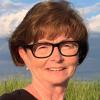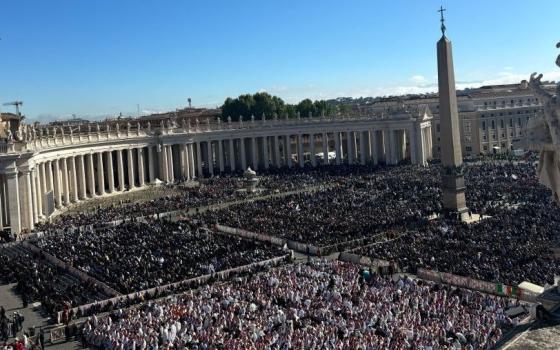A registered nurse in Little Rock, Arkansas, checks on a COVID-19 patient at the University of Arkansas for Medical Sciences Aug. 16, 2021. (CNS/Reuters/Shannon Stapleton)
After I left full-time ministry as chief physician assistant in emergency medicine at North Central Bronx Hospital in New York City to assume the role of president in our congregation, I was asked by a reporter if I had it in me for a third wave of COVID.
I reflected and sadly responded, "No." I, like all health care providers, poured myself into my ministry in March 2020 and faithfully answered the call of COVID and then the delta variant a year later. I still marvel and am humbled by the fact that I am alive. I, along with my colleagues, was bathed in COVID in the early days. Lack of personal protective equipment, lack of knowledge about the illness, and lack of resources left us in a life-threatening position. As Brené Brown said in a CBS 60 Minutes report, "You will not find courage in a person without vulnerability." And vulnerable we were! And vulnerable we continue to be!
Although I am now in congregational leadership, my heart and support are still with my co-workers. I have provided sessions of Helping Healers Heal, a program set up even before COVID to give medical providers a space to share experiences with others who could empathize. This program was invaluable during COVID and continues to be today. I even went back to do a 12-hour shift when the staff was stressed by the deaths of family members, emergency surgery, and yes, even the birth of a baby who came early. When I facilitated the Helping Healers Heal session, I was struck by the many feelings of the staff. Those feelings ranged from fear, dismay, anger and disbelief that they were in the midst of another wave of COVID.

Sr. Mary Catherine Redmond, second from right, poses with colleagues. She is an emergency medicine physician assistant. PA, Kelsey Lopez, MD (Courtesy of Mary Catherine Redmond)
COVID, whatever the variant, even if its symptoms seem like the common cold, is COVID. My body has a visceral reaction when I hear the word "COVID." I see people about to die from this horrible virus. I see families ravaged with grief. I see body bag after body bag.
COVID caused me to close my circle tightly, and this past Lent I made it my intention to widen my circle and open myself up to things I hadn't done for the past two years. There was great anxiety as I traveled (by car) to North Carolina to attend the wedding of a friend's son, fear as I went places where there were crowds, and I experienced anxiety like I have never known before. Widening my circle meant being in crowds of people — some of whom didn't even believe COVID was real, some who didn't believe in getting the vaccine and some who thought getting COVID now was better than getting it earlier.
It is difficult to be with people who don't believe what I saw and lived so vividly. It is difficult to reconcile how a pandemic so tragically divided so many — when my experience with my circle of co-workers, family, community and small circle of friends meant pulling together to protect, save and support one another. My story echoes the story of many health care workers who are still in the midst of wave after wave of this virus.
I did widen my circle, but it was not easy. Part of widening my circle was leaving the small group of co-workers, close family, community members and friends who surrounded me during my darkest time. The hardest was leaving my co-workers who knew the fear and anxiety I was talking about without me having to explain too much. I fervently tell people that health care workers are burnt out. When the new chief physician assistant (PA) came to me for advice about what to do to help the staff, I told her to encourage each person to do what they need to do for their own physical, psychological and spiritual health. Then I suggested she go to the PA on staff who is a military veteran and ask her what they do in the service when people are fighting for long periods without a break. Essentially, that is what is happening in medicine.
Right after Easter, after a six-month absence, I went back to the emergency department for a shift. Many of those I had worked with had retired, and some left for other departments. Those I worked with on that shift are broken healers who are still desiring to do their jobs and trying to figure out how to best do what they are called to do while taking care of themselves and their families. As I continue to talk with people and hear their stories — the sisters in my community and others in religious life, people of all different occupations and those in college and school, I know that COVID has had lasting effects on so many. The isolation, fear, lack of support as so many were in survival mode dealing with the unknown, has left all broken, vulnerable, searching; not one person has escaped the effects of COVID.
Advertisement
COVID is only one part of a world where division continues. There is so much that fractures our families, local communities, our states, country and world. We have become a world where people stay in their own camps of belief and fail to reach out to the "other." We have lost the ability to be curious about others, to say, "Help me understand" and to be willing to listen. We all have been in our own survival mode for so long that it is hard to see others and respond.
I hope as we experienced Pentecost, we were invited by the Holy Spirit to call on the gifts of the Holy Spirit: wisdom, understanding, counsel, fortitude, knowledge, treating God with respect, and discerning the will of God in all we do. May we widen our circles, little by little, and continue the work of building the kingdom of God on Earth. May each person in her/his own way cross boundaries to understand, welcome and share life with another. This is needed now more than ever.
In a recent episode of the TV show "New Amsterdam" a doctor — dismayed by how she was treated by some after COVID — asked, "Where is the hope?" The reply: "You are hope." My prayer is that we recognize the hope that each person carries, and we all believe that we are the hope at this point in our history.
May the Holy Spirit bless us all with whatever gift we need this Pentecost season. As we talk in our own language in our upper rooms may the blessing of the Holy Spirit inspire us to go out and spread the gift we receive.







